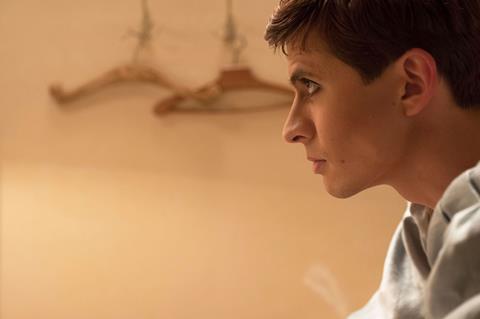Ralph Fiennes tracks the tense defection of Kirov Ballet dancer Rudolf Nureyev to the West in 1961

Dir. Ralph Fiennes. UK. 2018. 122 mins
The 1961 defection of ballet dancer Rudolf Nureyev from the Soviet Union to the West is the core of this drama, but the structurally ambitious screenplay interjects with early life fragments and formative moments throughout. Dancer Oleg Ivenko, the soloist from the M. Jalil Tatar State Academic Opera and Ballet Theatre, makes up for his inexperience as an actor with a fiery physicality in the central role. It’s possible that ballet aficionados may take issue with the authenticity of the performance component of the picture – who, after all, can step into the tights of one of the most legendary ballet dancers of the twentieth century without drawing comparisons? But as a French dancer Pierre Lacotte (Raphaël Personnaz) observes, with Nureyev, it is the spirit, rather than technical perfection, which counts.
The defection sequence itself is terrifically tense and slickly executed
More problematic is the fact that the cluttered structure, littered with brusque little flashbacks, repeatedly interrupts the momentum and tension of the story of Nureyev’s most daring leap.
Ralph Fiennes’ name on the credits – in addition to directing, he also appears in the film, giving a gentle, generous performance as Nureyev’s enigmatic mentor Pushkin – will be a key marketing point for a film which should be an attractive prospect for festivals and some arthouse distributors. The casting of Ukrainian dance superstar Sergei Polunin in a supporting role is an astute move. It should raise awareness of the film with younger audiences for whom Nureyev doesn’t have quite the same currency as it will with older ballet fans.
The title, a translation of a Russian expression, refers to someone unusual and extraordinary. And two early scenes are at pains to stress how fitting this description is for Nureyev. First comes the moment of Rudolf’s birth, on a Trans-Siberian train, filled with vodka-swilling gamblers and peasants. The scene, like all the flashbacks to a childhood pinched with cold and privation, is drained of colour until it’s almost monochrome. Fiennes underlines the symbolic resonance of his birth-in-transit by having Nureyev trawl through the toyshops of Paris looking for the best toy train set that they have.
This scene is followed by Nureyev’s first experience of Paris in 1961. The colour palette here is the opposite end of the spectrum – as saturated as a vintage postcard. While the other Kirov Ballet dancers dutifully file into their hotel, Nureyev forges his own path, wandering off alone and soaking up the sights and culture of the city. Fiennes slightly overdoes the signifiers of opportunity and freedom, with a road sign announcing ‘Republic’ placed prominently in the centre of the screen, and a crash zoom to emphasise the word ‘Liberte’.
Nureyev’s Parisian adventures introduce him to fellow dancers, and to a chic Chilean heiress, Clara Saint (Adèle Exarchopoulos), who opens his eyes to the liberated attitudes to arts and sexuality in the West. And while the run-up to his escape, punctuated as it is by flashbacks and a few too many shots of Nureyev gazing, transported, at various pieces of great art, fails to muster much suspense, the defection sequence itself is terrifically tense and slickly executed.
Camerawork throughout has a vital, unpredictable energy which echoes that of the central character; however the jarringly extreme grading choices in post production detract a little from to technical skill on show.
Production company: Magnolia Mae Productions, Metalwork Pictures, Montebello Productions, Work in Progress
International Sales: HanWay Films info@hanwayfilm.com
Producers: Gabrielle Tana, François Ivernel, Andrew Levitas
Screenplay: David Hare
Production Design: Anne Seibel
Editing: Barney Pilling
Cinematography: Mike Eley
Music: Ilan Eshkeri
Main cast: Oleg Ivenko, Adèle Exarchopoulos, Sergei Polunin, Ralph Fiennes, Chulpan Khamatova, Olivier Rabourdin, Raphaël Personnaz, Louis Hofmann















![[L-R]: Amanda Villavieja, Laia Casanovas, Yasmina Praderas](https://d1nslcd7m2225b.cloudfront.net/Pictures/274x183/6/4/1/1471641_pxl_20251224_103354743_618426_crop.jpg)








